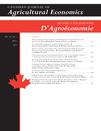
CANADIAN JOURNAL OF AGRICULTURAL ECONOMICS-REVUE CANADIENNE D AGROECONOMIE
Scope & Guideline
Innovating Insights in Agricultural Economics
Introduction
Aims and Scopes
- Agricultural Economics and Policy Analysis:
The journal emphasizes empirical research that assesses agricultural policies and their economic implications, exploring how these policies affect farmers, consumers, and the broader economy. - Sustainability and Environmental Impact:
There is a strong focus on sustainability within agricultural practices, including the analysis of environmental impacts and the exploration of sustainable agricultural innovations. - Market Dynamics and Consumer Behavior:
Research frequently examines market structures, price dynamics, and consumer preferences, providing insights into how these factors influence agricultural production and trade. - Gender and Social Dimensions in Agriculture:
The journal includes studies that explore the role of gender and social equity in agriculture, addressing how these factors influence productivity and decision-making. - International Trade and Agricultural Economics:
A significant area of focus is on international agricultural trade, including the analysis of trade agreements, market access, and global supply chains.
Trending and Emerging
- Impact of Climate Change on Agriculture:
Recent papers increasingly address the implications of climate change on agricultural production and trade, highlighting the need for adaptive strategies in farming. - Consumer Preferences for Sustainability:
A growing trend involves examining consumer behavior regarding sustainability labels and how these preferences influence agricultural markets. - Technology and Innovation in Agriculture:
There is an emerging focus on technological advancements and their role in improving agricultural efficiency, including precision agriculture and biotechnological innovations. - Economic Resilience Post-COVID-19:
The journal has increasingly published research on the impacts of COVID-19 on agricultural markets, emphasizing resilience strategies and recovery pathways. - Risk Management in Agriculture:
There is a notable increase in studies exploring risk management strategies in agriculture, especially in relation to market volatility and environmental risks.
Declining or Waning
- Traditional Farming Practices:
There has been a noticeable decline in papers focusing solely on traditional farming practices without the integration of modern economic analysis or technology. - Basic Agricultural Production Models:
Research centered around basic production models without consideration for external factors such as climate change or market dynamics seems to have decreased. - Historical Economic Analysis:
The frequency of studies that focus on historical agricultural economic analysis, particularly those that do not tie into contemporary issues, has waned in recent years. - Local vs. Global Market Comparisons:
While local market studies were once prevalent, recent publications suggest a shift towards global market dynamics, reducing the emphasis on localized agricultural economic analyses. - Static Economic Analysis:
There is a declining trend in static analyses that do not incorporate dynamic elements such as risk management or behavioral economics.
Similar Journals
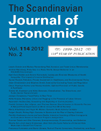
SCANDINAVIAN JOURNAL OF ECONOMICS
Exploring the Frontiers of EconometricsSCANDINAVIAN JOURNAL OF ECONOMICS (ISSN: 0347-0520, E-ISSN: 1467-9442), published by Wiley, stands as a pivotal platform for disseminating research in the fields of economics and econometrics. With an impressive Q1 ranking in both disciplines, this journal plays a critical role in advancing theoretical and applied economic research, catering to an international audience of scholars, practitioners, and students. Its coverage from 1977 to 2024 demonstrates a robust commitment to publishing high-quality research that influences both policy-making and academic inquiry. Although it operates on a traditional subscription model, the journal remains accessible to a broad readership, which is essential for fostering knowledge sharing within the economics community. As such, the SCANDINAVIAN JOURNAL OF ECONOMICS is an essential resource for those seeking to explore the latest developments and methodologies in economic research, helping to bridge practical insights with academic rigor.
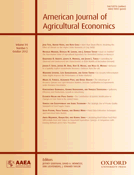
AMERICAN JOURNAL OF AGRICULTURAL ECONOMICS
Empowering Economists with Cutting-Edge ResearchThe American Journal of Agricultural Economics, published by Wiley, stands as a premier peer-reviewed journal in the fields of Agricultural and Biological Sciences and Economics and Econometrics. Established in 1919, this esteemed journal has a history of contributing significant research and insights that shape agricultural policies and economic frameworks. With an impressive Q1 ranking in both stated categories and maintaining a notable standing in the Scopus rankings—Rank #7 out of 193 in Agricultural and Biological Sciences and Rank #71 out of 716 in Economics—this journal is recognized for its high-quality scholarship and impactful research findings. Researchers, professionals, and students alike will find a wealth of knowledge within its pages, addressing critical issues in agricultural economics and providing cutting-edge analyses that inform both theory and practice. Stay ahead of the curve in this dynamic field by engaging with the American Journal of Agricultural Economics, where future trends and innovative solutions meet scholarly excellence, enriching our understanding of the agricultural economy.

JOURNAL OF AGRICULTURAL ECONOMICS
Exploring the nexus of agriculture and economics.JOURNAL OF AGRICULTURAL ECONOMICS, published by Wiley, is a leading scholarly journal dedicated to the field of agricultural economics. Since its inception in 1928, the journal has provided a platform for rigorous research, offering insights and analysis on the economic aspects of agriculture, food production, and rural development. With an impressive impact factor and ranked in the Q1 category in both Agricultural and Biological Sciences as well as Economics and Econometrics, it stands among the top-tier publications in its field. The journal's ISSN is 0021-857X, and it also has an E-ISSN of 1477-9552. Researchers, professionals, and students seeking to enhance their understanding of agricultural economic policies and practices will find invaluable resources, empirical studies, and theoretical discussions within its pages. The JOURNAL OF AGRICULTURAL ECONOMICS remains an essential conduit for advancing knowledge and shaping discussions that matter in the global agricultural economy.

Agricultural Economics-Zemedelska Ekonomika
Connecting research and policy for agricultural advancement.Agricultural Economics-Zemedelska Ekonomika is a prominent open-access journal published by the Czech Academy of Agricultural Sciences, dedicated to advancing the field of agricultural economics and related disciplines. Since its inception in 2007, this journal has provided a vital platform for researchers, professionals, and students to disseminate and engage with cutting-edge insights and empirical studies that contribute to the understanding of agricultural practices, economic theories, and policy analysis. With an impressive impact factor reflected in its 2023 quartile rankings of Q2 in both Agricultural and Biological Sciences and Economics, Econometrics and Finance, the journal ranks highly among its peers, specifically occupying the 46th position out of 288 in General Economics and 40th among 193 in Agricultural Sciences, highlighting its broad relevance and respected status. The journal's open access model ensures that research is widely disseminated and easily accessible, fostering an inclusive academic environment that encourages collaboration and knowledge sharing. With a commitment to publishing quality research until at least 2024, Agricultural Economics-Zemedelska Ekonomika remains a crucial resource for those dedicated to improving agricultural productivity and sustainability through economic insight.
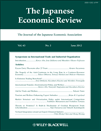
JAPANESE ECONOMIC REVIEW
Advancing insights into Japan's economic landscape.Japanese Economic Review, published by Springer Heidelberg, is a renowned academic journal that aims to advance the understanding of economic processes within the context of Japan and the Asia-Pacific region. With an ISSN of 1352-4739 and E-ISSN of 1468-5876, this journal features high-quality research articles that span a broad range of topics in economics and econometrics. Ranked in the Q2 category for Economics and Econometrics as of 2023, it holds a Scopus rank of #332 out of 716, placing it in the 53rd percentile among its peers. Although not Open Access, the journal invites contributions that provide insights and empirical analyses beneficial to both academics and practitioners. Emphasizing a deep understanding of economic dynamics, the Japanese Economic Review is essential reading for anyone interested in the implications of economic policies and trends, making it a significant platform for scholarly dialogue and research dissemination.

Economia Agraria y Recursos Naturales
Empowering Voices in the Quest for Environmental SolutionsEconomia Agraria y Recursos Naturales, published by UNIV POLITECNICA VALENCIA, EDITORIAL UPV, is a prominent open-access journal that has been serving the fields of agricultural and biological sciences, environmental science, and geography since 2001. With an ISSN of 1578-0732 and an E-ISSN of 2174-7350, this journal is dedicated to publishing high-quality research that contributes to the sustainable management of natural resources and agricultural practices. The journal invites scholars, practitioners, and students to explore and share innovative findings that address pressing environmental challenges. While currently categorized in the lower quartiles (Q4) for various disciplines in 2023, its open-access model ensures wide dissemination and visibility for authors and their work, aligning with the growing trend towards accessibility in academic publishing. Positioned in Spain, Economia Agraria y Recursos Naturales is a valuable resource for those seeking to engage with the intersection of agriculture, environmental studies, and policy planning within a global context.
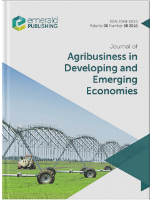
Journal of Agribusiness in Developing and Emerging Economies
Unveiling Strategies for Sustainable Agricultural GrowthJournal of Agribusiness in Developing and Emerging Economies is a prestigious academic journal published by EMERALD GROUP PUBLISHING LTD, specializing in the dynamics of agribusiness within the context of developing and emerging economies. With an ISSN of 2044-0839 and an E-ISSN of 2044-0847, this journal aims to provide a platform for high-quality research that examines agricultural practices, economic development, and their implications for global sustainability. The journal holds a respectable impact factor and is classified in the Q2 category across three crucial domains: Agricultural and Biological Sciences, Development, and Economics and Econometrics, reflecting its importance in the academic community. The journal spans research insights from 2011 and from 2016 to 2024, catering to a diverse readership that includes researchers, industry professionals, and students keen on advancing their understanding of agribusiness in rapidly evolving markets. Subscribers and readers can access pivotal research findings that are instrumental in shaping agribusiness strategies and policies in emerging economies.
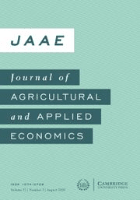
Journal of Agricultural and Applied Economics
Advancing knowledge for sustainable agricultural futures.The Journal of Agricultural and Applied Economics, published by Cambridge University Press, stands as a leading platform for disseminating innovative research in the fields of agriculture, economics, and applied sciences. With an impressive impact factor and a prestigious Q1 ranking in Agricultural and Biological Sciences and Q2 in Economics, this journal is recognized for its rigorous peer-reviewed content that addresses contemporary challenges in agricultural and economic policies. Since its transition to Open Access in 2015, it has widened its reach, allowing scholars, practitioners, and students unrestricted access to vital research findings. The journal's scope encompasses a wide array of topics, fostering interdisciplinary dialogue and offering insights essential for informed decision-making in the agricultural sector. Addressing critical issues from food security to sustainable practices, the Journal of Agricultural and Applied Economics is instrumental for anyone seeking to contribute to the advancement of knowledge in these pivotal areas.

Landbauforschung-Journal of Sustainable and Organic Agricultural Systems
Nurturing Innovation in Organic Farming ResearchWelcome to the Landbauforschung - Journal of Sustainable and Organic Agricultural Systems, a premier Open Access journal dedicated to advancing the fields of sustainable and organic agriculture. Published by the esteemed Johann Heinrich von Thunen Institute (VTI) in Germany, this journal has been a vital resource since its inception in 1977, fostering a deeper understanding of agronomy, crop science, and animal science. With an impressive Q2 ranking in both categories as of 2023 and recognized in the 70th percentile of its field, it stands as a beacon for researchers and professionals eager to contribute to environmentally responsible agricultural practices. The journal boasts an extensive archive from 2008 onwards, available under Open Access, enabling scholars and practitioners worldwide to engage with cutting-edge research without barriers. The Landbauforschung journal strives to connect scientific inquiry with practical applications, making it an indispensable platform for those committed to fostering sustainable agricultural systems.

JOURNAL OF AGRICULTURAL AND RESOURCE ECONOMICS
Advancing knowledge in agricultural and resource economics.Journal of Agricultural and Resource Economics is a pivotal platform in the realm of agricultural and resource economics, published by the Western Agricultural Economics Association. Since its inception, the journal has embraced an Open Access model, fostering widespread dissemination of research findings to benefit both scholars and practitioners in the field. The journal operates within an impressive global ranking framework, resting in Q2 across several pertinent categories including Agronomy and Crop Science, Animal Science and Zoology, and Economics and Econometrics. With its ISSN 1068-5502 and E-ISSN 2327-8285, it has garnered attention for its rigorous academic standards and impactful contributions to the discourse on resource management and agricultural practices. Researchers, professionals, and students alike will find the journal's ongoing commitment to advancing knowledge invaluable, with publications that span from 1996 to 2024 capturing evolving trends and insights in the sector.